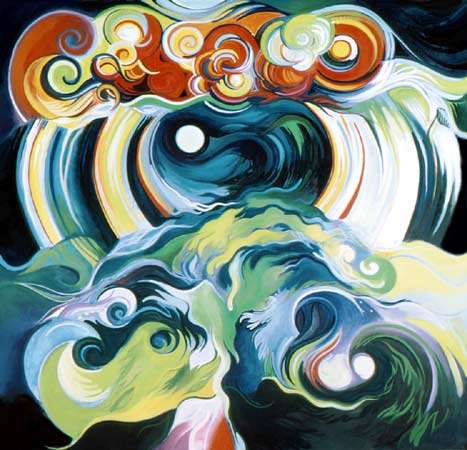
There is a line in the “yaa devee sarvabhooteshu …” Devee Stotra –
या देवी सर्वभूतेषु लज्जारूपेण संस्थिता|
(yaa devee sarva bhooteshu lajjaa roopena sansthitaa)
That devi who is present in all beings in the form of ‘lajjaa’.
Lajjaa? Now that is interesting!
So what is Lajjaa?
Lajjaa seems to get associated with “लाज”, “नारी की लाज” (naaree kee laaj) – a woman’s honor that supposedly gets taken away say when she is raped, or feminine modesty, mostly associated just with her physical parts and her social reputation. Or it may be conventionally viewed as sweet bashfulness, shyness, blushing of a woman, often in a romantic sense. However, that is just a tiny tiny part of lajjaa.
Lajjaa essentially conveys a sense of shame, disrepute, disgrace – in any context. Bashfulness, reserve, modesty, these are also words used to translate the sense of lajjaa, because they are attempts to avoid shame, disrepute, disgrace. So when something undesirable occurs, people exclaim, “tumne aisaa kiyaa? kitnee lajjaa kee baat hai!”.
To me, the best explanation of the word lajjaa is – feeling embarrassed.
That feeling of embarrassment can be anywhere in a whole range of intensities. The mild: feeling somewhat silly. The stronger: feeling stupid. The very intense: feeling shame.
And it is in sarv bhooteshu (all beings) – i.e. all of us, all humans – man, woman and all other gender variations possible. In fact all beings, not just humans. So it has nothing to do specifically with women. Embarrassment is a feeling that we have all experienced and would prefer to avoid. It is because we want to avoid this feeling that we are hesitant to ask questions for example.
At times it is mild, and depending on our level of awareness, we do not explicitly recognize it as such but just feel a sense of discomfort. There is a slight internal squirming. At times it is so strong, it feels like a stab in the chest. We are unable to ignore it and are distressed.
That feeling, that stab of embarrassment, mild or forceful, is She. The supreme feminine force. And She exists in everyone. Sarv bhooteshu.
So here is an opportunity. Here is a way to actually experience Durga within. It is an opportunity specially because this feeling is so intensely personal and because when it occurs we experience it as a distinct sharp tinge. Also, we tend to be better at focusing on the negative within us than positive, so might as well use that tendency.
The next time you experience any tinge of embarrassment, experience it fully. Feel it completely, in all its textures. How it invades and gradually unwillingly departs. You will be directly experiencing Durga inside you!
Durga, that is, Shakti – power, energy, force. Emotional energy is the core driving force of our actions and there is energy, power, force in our so-called negative emotions too, if we connect to it. It can be a powerful exhilarating experience.
Image credit: Inner Eye Moon by Carol Herzer.
Vani, your equating Durga with ‘lajjaa’ is an excellent piece of postulation. Undoubtedly experiencing ‘lajaa’ can be a very powerful stimulant which can drive a person to some extreme form of repentance or other measures. But is it necessary to feel ‘lajjaa’ to experience this inner force within oneself? I suppose that the ‘inner force’ or Durga is needed to be experienced by a person all the time to improve oneself but is it necessary to invoke ‘lajjaa’ for it?
No, it is not at all necessary to invoke lajjaa specifically to experience Durga within. Lajjaa is just one of the many myriad forms in which She exists within us. If we connect to just about any of our emotions completely, we will be experiencing Durga. The thing is we experience almost none of our emotions completely. If it is a negative emotion, instead of experiencing it completely with full awareness we tend to try and numb it or fix it. If it is a positive emotion, we do not experience that completely either. We either worry about and plan for its continuation, or consider ourself unworthy, or take it for granted, or whatever else – hardly ever receiving it completely.
This article takes only one line from the referenced Devee Stotra. I chose this for the article because we are tend to be so hassled about our reputation (the core of the ‘what will other people think’ thought) – so that feeling is already present within us, no need to invoke, just experience whenever felt.
शक्ति की उपासक मैं भी हूँ सखी… लेकिन लज़्ज़ा की यह व्यायाख्या मेरे मत से थोड़ी विविध है।
लज़्ज़ा… जिसे हम मानते हैं वे दरअसल समाज़ की…पुरुषवादी सोच की वर्जनाएं हैं…जो स्त्री की अनुरूपता की आकांक्षाएं हैं।
जहाँ स्त्री उन व्अर्जनाओं का उल्लंघन करना चाहती है …उस पर लज़्ज़ाहीनता की लेबलिंग कर दी जाती है।